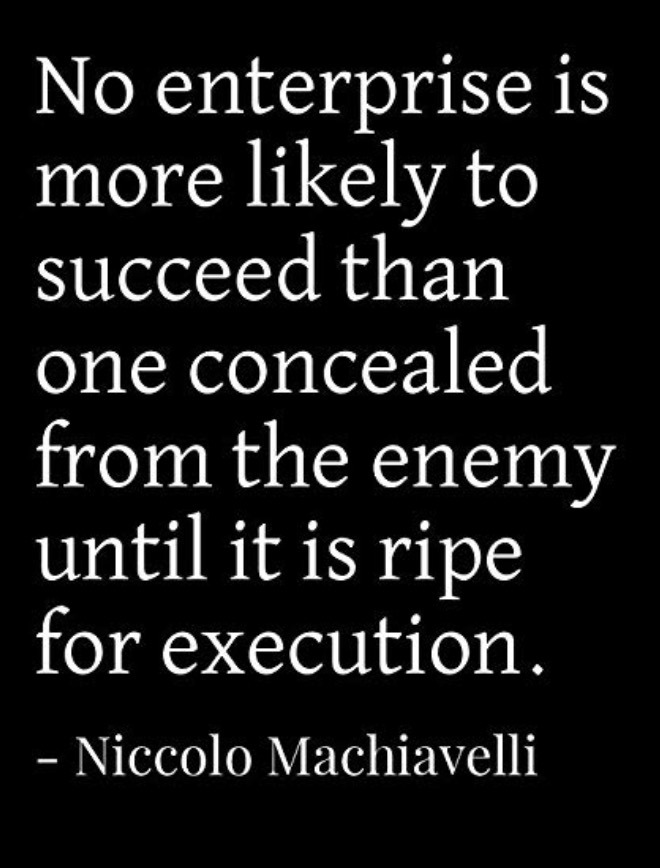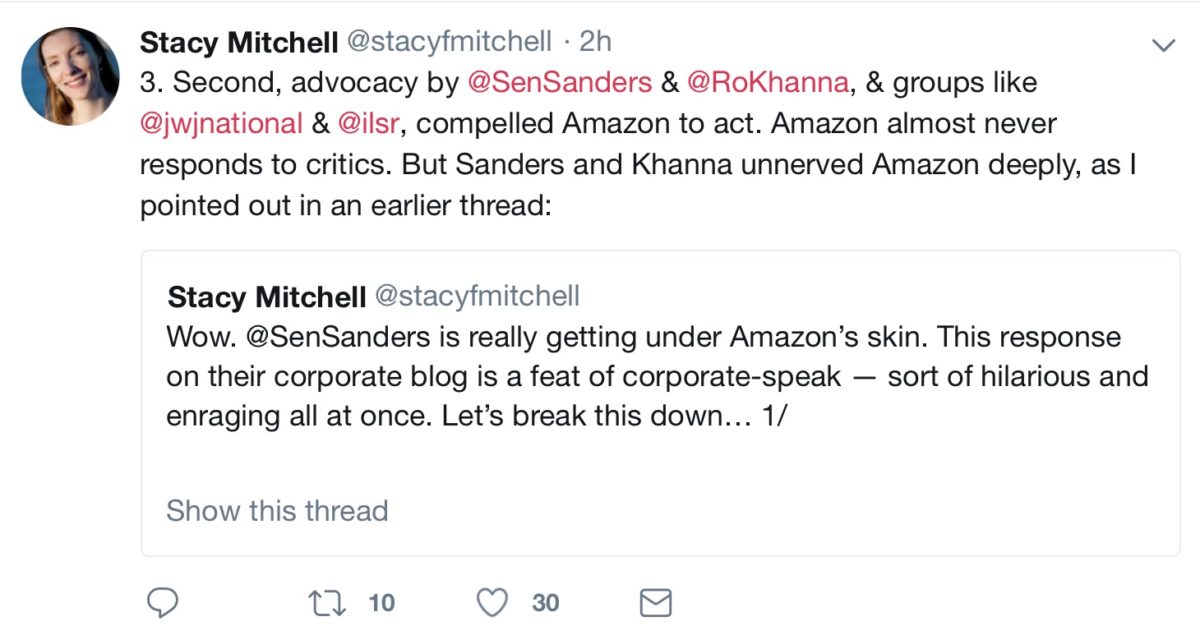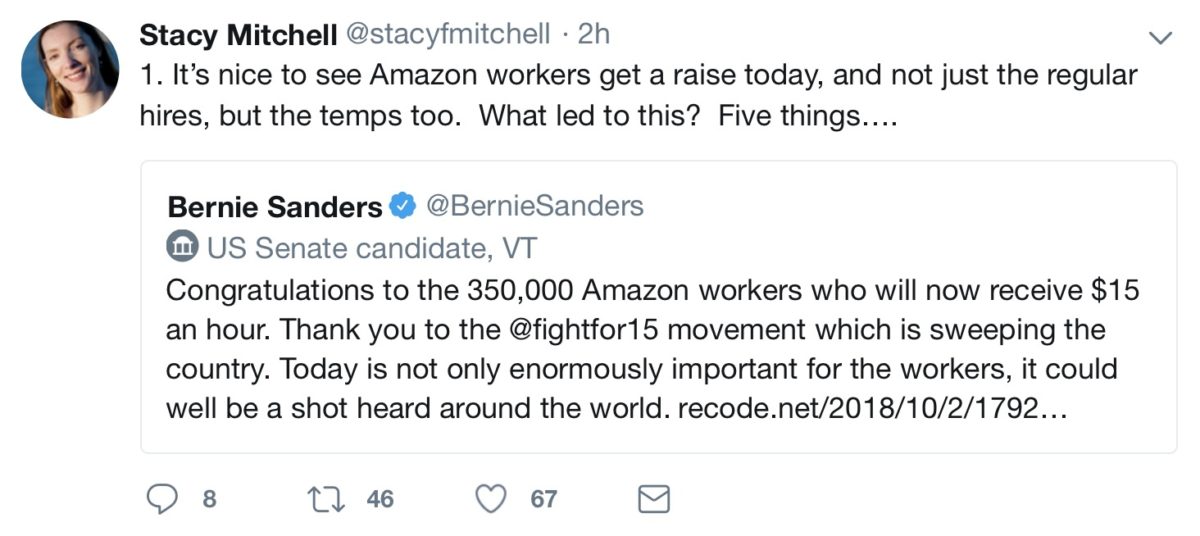
For the many low wage Amazon workers — both full time and temporary — set to receive a raise thanks to the just announced boost in minimum pay to $15/hour, the news is certainly a big plus. It should also be noted that had Amazon not been subject to intense scrutiny and criticism from the likes of Bernie Sanders and others, Jeff Bezos never would have responded with such an aggressive move. That said, if you think a little beyond the surface level about why he’s doing this now and what his real motives are, it becomes clear nobody should take this move at face value.
Stacy Mitchell, co-director at the Institute for Local Self-Reliance, is someone whose work on Amazon I’ve cited on various occasions. She tweeted out an important thread this morning that helps you take a step back and not miss the forest for the trees.


Bezos is naturally attempting to portray this as a come to Jesus moment, but you shouldn’t buy his spin for a second. Based on what we know of his business practices, the guy’s built the behemoth that is Amazon by operating in a Machiavellian fashion (see my recent post: Amazon is Far More Dangerous and Powerful Than You Want to Admit).
The real tell here is Bezos’ immediate emphasis on raising the national minimum wage to $15 an hour under the law. Pushing for a forced across the board wage hike everyone knows Amazon can cope with better than current or potential competition, makes his company look good while likely harming other business models in the process.
This is how Bezos rolls, he’s willing to take short-term hits to dominate a market. What sacrifice is a wage hike if he assumes everyone else will have to do it as well? He knows Amazon’s got the resources and capability to automate in a way others simply can’t. Bezos see this as a win-win if he can also get everyone to pay $15 an hour. He gets to look like a leader, while also positioning Amazon for even greater market dominance in the long-run. You really think Bezos is advocating for a national minimum wage increase because he’s suddenly a Bernie Sanders populist? Don’t be stupid.
Which brings us to the next point. While Bezos’ well documented piss poor treatment of low level employees is well documented, Amazon poses a much larger threat in other respects. It’s not just the company’s increased ties to the U.S. military and intelligence agencies, though that’s dangerous enough. The company’s largest threat resides in its desire to not just dominate the market, but to become the market itself.
As Stacy Mitchell noted in her excellent 2017 article:
To describe Amazon as a retailer is to misunderstand what the company actually is, and to miss the depth of the threat that it poses to our liberty and the very idea of an open, competitive market.
It’s not just that Amazon does many things besides sell stuff—that it manufactures thousands of products, from dress shirts to baby wipes, produces hit movies and television shows, delivers restaurant orders, offers loans, and may soon dispense prescription drugs. Jeff Bezos is after something so much bigger than any of this. His vision is for Amazon to control the underlying infrastructure of the economy. Amazon’s website is already the dominant platform for digital commerce. Its Web Services division controls 44 percent of the world’s cloud computing capacity and is relied on by everyone from Netflix to the Central Intelligence Agency. And the company has recently built out a vast network of distribution infrastructure to handle package delivery for itself and others.
Jeff Bezos is a highly intelligent and cutthroat individual. He’s able to see multiple steps ahead of most people, and this move to raise wages is a perfect example. He figures he can look like the good guy in the near-term, while solidifying market dominance and monopoly power in the big picture. Bezos plays the long game and he plays it really well. Don’t take your eye off the ball or believe the hype for a minute.
You can think it's good Amazon employees are getting a wage increase and also understand Bezos is not coming from a good place.
These two things are not mutually exclusive.— Michael Krieger (@LibertyBlitz) October 2, 2018
If you liked this article and enjoy my work, consider becoming a monthly Patron, or visit our Support Page to show your appreciation for independent content creators.
Donate bitcoins: 35DBUbbAQHTqbDaAc5mAaN6BqwA2AxuE7G
Follow me on Twitter.









A single innovator is growing their business to such a level that they can potentially control the economy of the richest nation on earth? Surely this is the stuff of sci-fi dystopian movies, not a real life end game?
Excellent article. It underscores the necessity of breaking ruling class domination before paring down its overwrought government.
Also coincides with the deception that Liberalization as freedom https://therulingclassobserver.com/2018/10/02/liberalization-is-not-freedom/
I agree completely with Mr. Krieger, and Stacy Mitchell about Amazon. We need to also recognize that the Federal Minimum Wage still stands at $7.25/hr. This a draconian, unlivable wage supported by both the Obama and Trump administrations. The inhumanity of maintaining this standard is emblematic of the sociopathy of both political parties and corporate culture in general. There needs to be a pervasive, and supportive change at all levels of commerce, and of course the U.S. government will not support such change. Change needs to come from us.
Well said, Chris.
Question: Why should the price of labor not simply be governed by market forces?
Answer: because the cost of the goods that labor must purchase is not governed by market forces, but is regulated, increasing costs that reward the largest industry players due to their better ability to scale.
Question: so if we stop regulating other industries, we’ll reduce costs and foment competition, which inherently reduces prices, thereby eliminating the need to regulate the price of labor by legislating a minimum wage?
Answer: well, that’s not really what I meant…
Question: if we legislate a higher minimum wage, won’t that increase costs, and in greater proportion to smaller players, as well as prices?
Answer: ummm, yes.
Question: so, in practice, a minimum wage rewards large players to the detriment of smaller players, thus discouraging competition and increasing prices?
Answer: wellllll…. you could say that, but…
Question: isn’t that sorta like legalizing the cronyism that is the reason we called for a higher minimum wage? Kinda like stealing a dollar from an unsuspecting person and then giving them a nickel after they tell you they were robbed?
Answer: that is a supportable conclusion, but it’s only hypothetical.
Question: so by calling for a minimum wage, we are actually condoning and legitimizing widespread corruption?
Answer: you’re just not feeling the Bern… go to http://www.dsausa.org for better bleat-tails, I mean details.
@Nightinabox
It’s easy to win an argument when you are able to write the opposing argument.
All I can think when I hear folks waxing poetic about “ending regulations”, is: what regulations? At which companies and in which industry? Perhaps you can be the first to offer concrete information.
And please do back up those specifics with real life examples of the common people (like you and me) ever gaining anything from such deregulation.
Or perhaps you believe Bernie Sanders invented the 8 hour work day, or overtime pay, or the end of child labour, or the illegality of discrimination based on gender, race, etc, or workplace safety regulations…and on and on.
What I mean is that this is a fight that has been waging for centuries and no one in their right mind would hand in the gains (see above) that our ancestors literally died for. A living wage is the next battle in this war.
@trained patsy:
You’ve obviously never owned a business or attempted to educate yourself in business or economics. Anything a curious mind wants to learn, if they have the intellectual horsepower required, is available, mostly for free, on the thing called the World Wide Web… Al Gore invented it, I’m sure you’re familiar with him.
Here are some resources for you to continue to ignore:
https://www.sba.gov/sites/default/files/The%20Impact%20of%20Regulatory%20Costs%20on%20Small%20Firms%20(Full).pdf
https://www.stlouisfed.org/publications/regional-economist/july-2016/scale-matters-community-banks-and-compliance-costs
https://www.mercatus.org/publication/cumulative-cost-regulations
https://economics.mit.edu/files/10811
https://www.cfr.org/blog/costs-and-benefits-government-regulations-business
https://www.google.com/amp/s/www.wsj.com/amp/articles/regulatory-costs-inflate-new-home-prices-builders-say-1469209864
Doubling a worker’s wage compared to what it was yesterday, is not the issue and absolutely no solution. The REAL issue is a worker’s wage compared to that of a CEO. (symbolically)
THIS!!! A formula which used factors like the number/pay/benefits/full vs. part-time workers vs Owner/Upper management/shareholder compensation could be used to set corporate/management/share tax rates.
Lots of low-paid/no-benefit/part time jobs in a multi-billion$ corporation, but Bezos/Zuckerberg-style cash-grabbing and tax-sheltering at the top? High% corporate tax rate, taxes proven to be sourced from management/share compensation. In other words, don’t attempt to squeeze workers, suppliers (and their workers) and consumers to pay the tax bill. Bezos and the Walton brats need our money why? Their workers sure could use a livable cut of the profits…
Obviously, many details to be considered make it “work”, but onerously taxing the psychotic “too much is never enough crowd” is the only way to stop the Bezos and Rothschilds of the world.
He also took our stock options and VCP (monthly bonus to building goals) with this “raise”. The tax write off wasn’t worth it I guess.
Right. These two take-aways have not been reported in all news pieces.
Also, that $15 per hour gives an annual gross amount of $31K. This is before all non-federal taxes, rent, utilities, car payments, student loan payments, health care payments before large deductibles, food, child care, and the general despair from working like a hamster. In no way is it a living wage.
The ruthless practices of Amazon up to the present are reason enough to invoke antitrust and break it into 10 competing companies. Look at what Bezos has done with Whole Foods: slashing prices into losing territory for no purpose other than to kill off his competitors, who have no ability to withstand a red streak the way he can. In fact, has Amazon ever turned a profit?
It seems like this company is a made-for-TV monster. Its stock value is through the roof, it can’t make a profit, its killing retail and small businesses, its tying itself into every conceivable quasi-governmental entity to protect itself from antitrust, it makes unpardonable deals with government agencies — and Bezos himself only knows what else.
As a result, Malls and downtown are turning into wastelands (well, fellow ruthless cartel pal Wal-Mart had a hand in that too).
There are other signs that Amazon is beginning to abuse its monopolistic stature, as all pre-antitrust monopolies do. Take shipping: regular shipping was always reliable, until Prime came along. Now, only prime gets normal shipping. Regular orders get put on ice for a few days to compel customers to buy Prime. Coercion is the hallmark of a monopoly losing respect for the customers it no longer has to compete for.
Time to bust this trust!
I am a small l libertarian when it comes to business. But what we have now is a capitalist system dominated by crony capitalism at the upper strata’s.
As a result, small to medium (and even a lot of large) businesses are operating on a playing field that is vastly tilted towards the largest corporations in every industry.
As history has clearly shown, the only way to deal with crony capitalism and monopolistic practices at this level, is to break up the monopolies, and actually enforce regulations.
As Ron Paul said after the dust had settled in 2009; “We don’t need more regulations. We need to actually enforce the regulations we already have in place”.
We’re living in the era of the captured regulator. As long as the revolving door between the regulators and the companies they are supposed to regulate is allowed to keep revolving the regulators will continue to be captured.
..
Indeed, Genaro. Indeed.
Great article, Michael!
Those familiar with history have seen this story before, namely the oligarchs of late 19th century America, whose power overshadowed that of a then puny government. They controlled the large industries of their day: railroads, oil, tobacco, beef, steel, etc., and used the strength of their monopoly position to gouge customers and destroy competitors.
Humanity is still pretty much the same, as there are still would-be Rockefellers and JP Morgans among us that are hell-bent on owning the world, with Jeff Bezos being our modern version. However, with globalization the playing field has changed dramatically in the last century. I have little confidence that a new Teddy Roosevelt will come along to start enforcing the Sherman Antitrust Act of 1890, by breaking up monopolies and regulating abusive businesses.
No, these idiots are too blind to see the damage and suffering they cause, and are already receiving adequate warnings. Based on the growing resentment in the peasantry, circumstances are looking less like 1890 America and more like 1789 France.
By now I’d expect nearly everyone to assume Bezos isn’t being aboveboard with gestures like this. There are undoubtedly ulterior motives at play and Mitchell has outlined the most obvious ones in the article.
I don’t even bother debating the merit of letting “market forces” set wages anymore because with this late stage Fed policy it doesn’t really matter. I used to wonder how long the central bankers could keep juggling chainsaws before an economic black swan event, but it seems increasingly apparent that the catalyst for any meaningful change will be social. However, far from 1789 France, ours is going to be a bloody and probably protracted affair.
I expect Bezos knows perfectly well how precarious US society is now and has contingency planning in place (for himself, not his peons).
Wages are fine.
It’s the prices that are inflated. What hasn’t been offered in wages has been made up with easy credit, thus supporting the inflated prices.
Look at the number one expense of everyone in America: housing.
Think easy credit has artificially inflated those costs?
Fundamentally, the cost of housing dictates the price of all other goods and services because housing always gets paid first, after taxes of course.
Adequate money has been supplied, it’s just at interest, which suffocates real economic expansion.
Only the ignorant believe that raising nominal wages does anything positive. Only real wage growth matters and that doesn’t occur unless prices grow at a slower rate.
Answer is a contraction of credit. Blasphemy, I know.
If you cut off the credit and stop subsidizing prices, the prices will, given time, adjust to the wages. Deflation is not nearly the armageddon that keynesians make it out to be. It just fucks up their fucked-up models.
The stock market will tank, of course… Which will suck.
I agree in theory, but like I said it no longer matters. Cheap money at the central bank level and easy access to credit at the consumer level are essential to keep the Ponzi going. They are hard coded into the equation at this point. Taking away credit only hastens the inevitable where the US starts to look a lot more like Iraq. We’re already teetering on the social brink as it is.
Since the only viable “solution” is collapse, we may as well enjoy our remaining time in the bubble as best we can. Soon enough 2018 will be seen as the good ol’ days.
Nothing Bezos does is “aboveboard”.
“Some Amazon employees say they will make less after the raise”
https://finance.yahoo.com/news/amazon-employees-say-will-make-less-raise-174028353.html
..
Excellent comments!
We all know that the Central Banks are not going to allow an economic contraction. They knew that cheap credit was the only way to prop up our hollowed out economy, and started driving it like a doped horse as far back as the Greenspan days, resulting in one bubble after another. But then Death Star’s are expensive, and you can’t rule the galactic empire on a stagnant economy that‘s limping along on mere organic growth.
The answer will likely be war.
It’s the tried and true method of resolving economic encroachment. And it allows for political culling and shuffling, domestically.
The Super Micro revelations may have brought us closer than anyone is admitting.
If it’s as pervasive as people say, you’d think China would feel like the clock is ticking on such a use it or lose it weapon.
“The Super Micro revelations”
This entire Russia canard, preceded by the entire general election circus/clown show has provided perfect cover for China.
As I always tell people about China. They have the same exact mindset as the Somali pirates. But they are far more sophisticated.
The Dinks have the same third world “dog eat dog” mentality as the Somali’s. But they are obviously far larger and far more dangerous, and on a global scale.
..
The problem is not that amazon or Bezos is too rich. The system is corrupt. It allows him to buy off politicians and implement favorable legislation. It’s the system, not the person. Don’t blame the person. Blame the system.
No. It is both the system, and the person who exploits the system for his own personal gain at the expense of others, that has to be held accountable.
Time for antitrust action for all FANG.